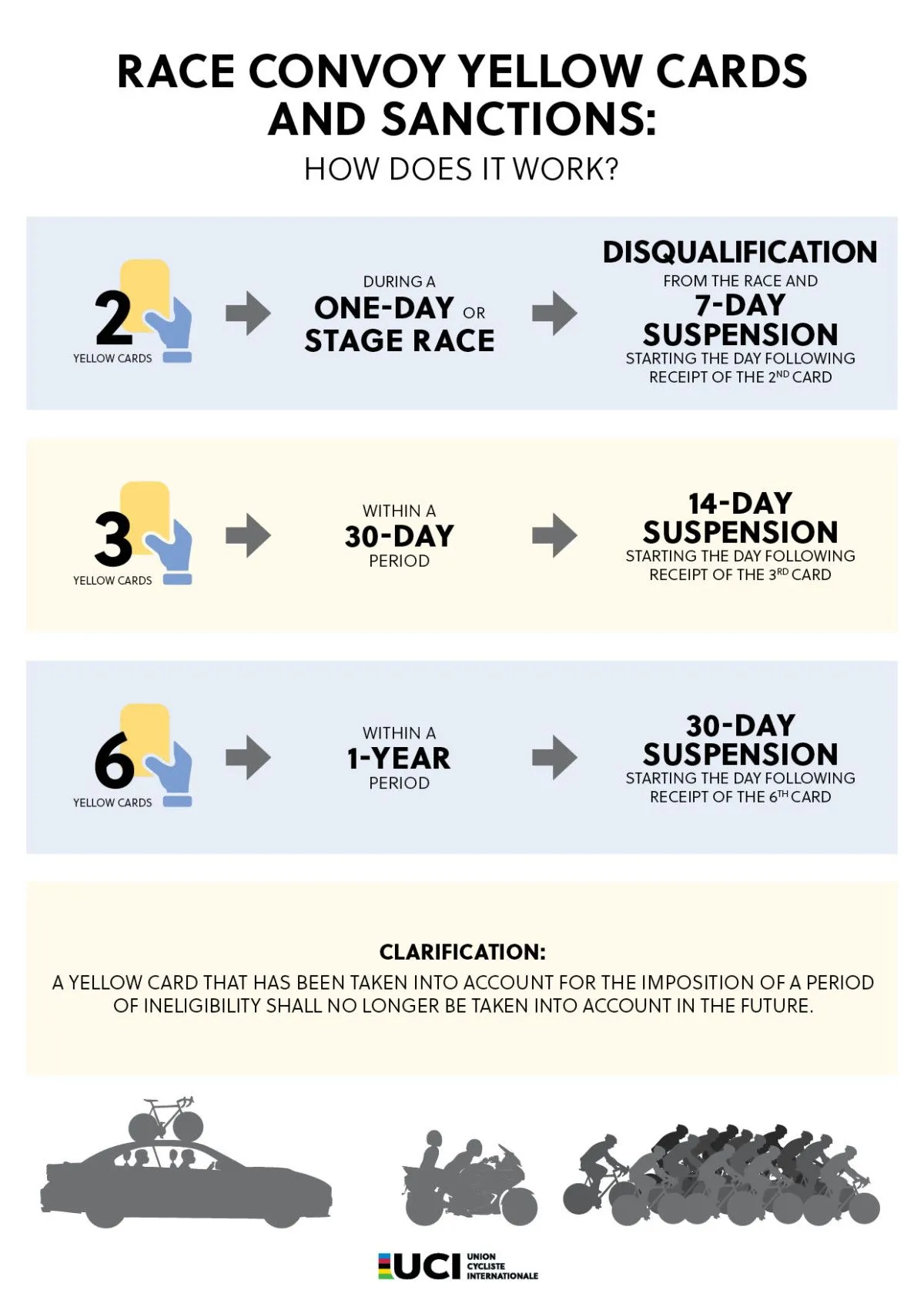Major victory for Cyclists and Visma | Lease a Bike! UCI finally unveils groundbreaking safety measures
CyclingThursday, 13 June 2024 at 21:00

On Wednesday evening, the UCI unveiled a comprehensive plan detailing new safety measures for cycling. The cycling federation outlined a notable feature in a press release: a new system being tested that involves yellow cards and suspensions. There is also consideration being given to the use of earpieces.
In recent months (if not years), the UCI has been under significant pressure regarding safety issues. This year, there were serious crashes in events like the Tour of the Basque Country and the Critérium du Dauphiné, which resulted in severe injuries to prominent riders. The safety organization SafeR, in which Visma | Lease a Bike and director Richard Plugge play key roles, has made recommendations that the UCI now intends to act upon. A crucial focus for Plugge and his team is having leaders in the race identify potentially dangerous points on the courses in advance. This will now be addressed through the 'SafeR Safety Analysts' who will advise race organizers on route planning, take risk-reducing measures, and ensure that teams uphold their safety responsibilities.
The safety plan further focuses on four points: the introduction of a yellow card system, restrictions on wearing and using earpieces during races, modification of the so-called 'three kilometer' (or 'sprint zone') rule, and simplification of the method for calculating time differences in stages ending in a mass sprint finish. "All these changes will be subject to testing periods during upcoming races and until the end of the season, in collaboration with stakeholders, before they are finalized and implemented," the statement reads.
Riders can be suspended
The system for yellow cards and potential suspensions will be tested from August 1 to December 31, 2024. Race juries have been issuing penalties for years, but will soon also be able to issue yellow cards for 'bad behavior'. SafeR will present the system to teams during this period, where in 2024, no penalties will be associated with a yellow card. Following an analysis in the winter, sanctions will be attached to such a card starting from January 1, 2025, in races at all UCI levels.
The penalties are quite harsh. Anyone who receives two yellow cards in one race will be disqualified and suspended for seven days. Three yellow cards within thirty days will result in a fourteen-day suspension, and six yellow cards in a year will lead to a thirty-day suspension. A red card is not needed in this system, as it already exists in the UCI regulations. Juries can disqualify riders in races. Thus, the yellow card system is merely an addition to the existing rules, including the imposition of fines and time penalties in races.
Check out the yellow card system below

UCI wants to ban earpieces more often
Another major issue in the new measures is regarding earpieces. In recent years, riders have consistently used earpieces during races, except in championships. The cycling union wants to test how racing without earpieces fares in other competitions for the remainder of 2024. "The list of involved events and stages has yet to be determined," it states. "This decision is based on discussions on this topic within SafeR, which concluded that earpieces can be both a source of distraction for cyclists and a physical danger because the radio units are mounted on their backs, posing a risk when a large number of teams ask their riders to move to the front of the race simultaneously."
During the test phase, various arrangements will be tried, including races where only two riders per team may use earpieces. An evaluation at the end of the season will determine future measures regarding this aspect. This does not apply to the three-kilometer rule. The UCI firmly announces that from now on, organizers can set the boundary for measuring time differences as far as five kilometers from the finish. Riders who encounter any issues in these final kilometers (crashes, mechanical problems, etc.) will not be penalized with time losses. This allows classification leaders to move aside sooner and let sprinters do their work.
Following this, the UCI will also test expanding the calculation of time differences. Riders will soon be able to finish three seconds behind the rider in front of them and still receive the same time. This will mainly apply in sprint stages, as in hill and mountain stages, a three-second difference will still be penalized. "This systematization of the three-second rule is intended to relieve pressure on riders not directly involved in the sprint and to allow them a certain margin with the front of the sprint," they explain, noting that three seconds corresponds to a gap of about fifty meters, not seventeen. This enables classification riders to finish more cautiously.
IDL-productions

After a somewhat forced exit from Alpecin-Deceuninck, Laurance brings van der Poel-like mindset to his new INEOS squad

Preview Tour of the Alps 2025 | Several riders challenge themselves in preparation for the Giro d'Italia

Preview Amstel Gold Race 2025 - women | Vollering, Vos, Van der Breggen, Kopecky, Pauline Ferrand-Prévot—The top riders are all lining up

Preview Amstel Gold Race 2025 | Pogacar vs. van Aert, with Pidcock, Nys, Evenepoel & others in the mix

Benoot on Visma | Lease a Bike's race tactics: "That other group had riders we did not want to encounter in the sprint"
Latest Cycling News

Hinault fires back at French critics over Pogačar doping suspicions: "What would they say if he were French?"

Nys plays it cool ahead of Ardennes: "Never felt better" and "It’s on my mind every day"

Marianne Vos follows van Aert in signing 'contract for life' with Visma | Lease a Bike

"Honestly, for a second I thought Evenepoel was returning the favor to van Aert for the Olympic road race. But no!"

After another top spot, Tibor Del Grosso believes his achievements are being 'hyped'; he skips the Ardennes spring classics
Popular Cycling News

Flashbacks to Amstel Gold Race? Questions raised over mysterious bottle given to Pogacar in Roubaix: "Not everyone gets permission"

Preview Amstel Gold Race 2025 | Pogacar vs. van Aert, with Pidcock, Nys, Evenepoel & others in the mix

After a somewhat forced exit from Alpecin-Deceuninck, Laurance brings van der Poel-like mindset to his new INEOS squad

Preview Brabantse Pijl 2025 | Evenepoel’s comeback, but also van Aert, Pidcock, a strong UAE team, and many more!

"Others get more respite"; is this the best van Aert? Question leads to candid answers at Visma | Lease a Bike
Latest Comments
- Such negative comments that are truly inappropriate and actually ridiculous. He sounds like an old man, bitter that he can't race anymore. Why can't he just be gracious? Or just shut up. Instead of howling for attention, in such a rude manner. Must be Dementia creeping in. We are all living in the Now. Records are there, and some are being broken, some are unapproachable. If he doesn't like it, and it makes him sick, maybe he ought start watching some other sport. Don't want the old mans health to be upset.
 reemmo031-03-2025
reemmo031-03-2025 - Roger De Vlaeminck inspires me to create a new beer: "Bitter Old Twat Belgian".JackInhof31-03-2025
- Shoot, I'll ride it for 1/10 of what his pay for that day is😅Veganpotter30-03-2025
- What is this? The Lance Armstrong daily cheaters channel? I could care less about Johan and Lance the seven times cheater. Greg Lemond was right all along, Why don't you write about that instead of these two knuckleheads.velodrone28-03-2025
- Are we all doomed to hear from Lance Armstrong and Johan bruneel until the end of time? It's not enough the stain they left on cycling? Do we have to see that shadow forever?bigyakman26-03-2025
- I am not sure if it is the hardest to win. In Flanders and Roubaix well before the finish the Peleton will be decimated and the race will normally be won by the best rider of the day or maybe 2nd or 3rd in case of a mechanical or unlucky break especially in case of Roubaix. In San Remo just before the finish there will still be several riders in contention and they are hard to ditch. For the best riders it is a race hard to win since it is not so selective. But if you are not a top 5 rider but still a top 10 rider this race is your best change to win. You will see more Milan San remo Winners with only 1 monument win than any other monumentsJoostmehrtens19-03-2025
- "fap fap fap oh Lance oh oh OHHHHHHH" again. Does he pay you to dredge up people with nice things to say about him? He was an giant a$$hole to people. It is a fact. Whatever his contrition about the doping, he is unapologetic about being a giant a$$hole to people. (Why yes, I do only login to complain. *I* am however only a giant a$$hole to people who laud giant a$$holes.)ericjensenridesbikes25-02-2025
- Remco is still very young. And injuries can absolutely keep you from overdoing it and getting worse. The recent Remco accident didn't keep him from being able to ride a recumbent inside. Wout's knee is a different story thoughVeganpotter23-01-2025
- Van der Poel style is winning by a half a lap and leading the race from the end of the second lap.
 Barnes127420-01-2025
Barnes127420-01-2025 - If she thinks talent alone will put her there she will not see many podium finishes much less a GC finish.....work as a team utilizing tactics to consistently be at the top.Germanrazor10-01-2025